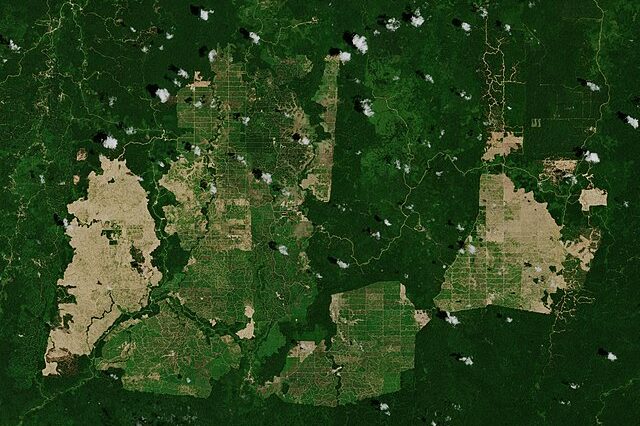
Despite promises from the UK government to halt the import of beef, soy, and palm oil products linked to deforestation, recent data has exposed ongoing imports of such commodities.
The Department for Environment, Food and Rural Affairs (Defra) faces criticism for not implementing measures to prevent the import of goods originating from high deforestation areas, despite the government’s commitment made at the Cop26 climate conference in 2021.
While the Environment Act of 2021 established a ban on commodities produced on illegally deforested land abroad, the rules have not been enforced due to Defra’s failure to publish the list of commodities covered by the regime.
The former environment minister Zac Goldsmith said: “We passed the Environment Act with much fanfare, not least so we could present ourselves as a world leader at Cop26 … and it was a genuinely landmark law to cut illegal deforestation caused by commodity production from our supply chains. But there has been virtually no progress since the law passed and not a single tropical tree has yet been saved.
“It should go without saying that there is no solution to climate change, indeed there is no future for our species, if we fail to halt the loss of the world’s great forests. So the government needs to stop with the delays and U-turns and get on with it.”
An investigation by Global Witness and Trase reveals that the UK continues to import seven commodities associated with deforestation, including palm oil, soy, and cattle products.
Between November 2021 and July 2023, an estimated 20,400 hectares (50,400 acres) of deforestation were linked to UK imports, with palm oil accounting for 8,800 hectares, soy for 3,470 hectares, and cattle products for 2,950 hectares. However, these figures are likely underestimates as they only consider raw commodities and not processed products containing these ingredients, such as chocolate.
Campaigners argue that the UK’s regulatory framework is weaker than that of the EU, which encompasses both deforestation and forest degradation. The UK’s ban solely addresses illegal deforestation, leaving room for further strengthening of measures to combat the environmental impact of imported commodities.
Veronica Oakeshott, the head of the forest campaign at Global Witness, said: “For two years, the government has been dithering about which deforestation-causing commodities to include in these regulations. In this time, tropical forests have continued to be destroyed to grow crops and graze cattle. And some of that product ends up for sale in the UK. This delay is tainting the UK public’s products – from the beef on our dinner plates to the palm oil in our shampoo.
She said the government should listen to UK retailers and fully align with the EU’s deforestation regulation, which covered all forest-risk commodities.
Oakeshott added: “It is outrageous that Defra is failing to press the green light on simple regulations needed to stop the UK importation of forest destruction. If the UK wants to be seen as climate leader, it must act now.”
A Defra spokesperson said: “The vast majority deforestation for commercial agriculture is conducted in violation of laws in producer countries, which is why our Environment Act includes world-leading due diligence legislation to help tackle this illegal activity and to rid these products from UK retail shelves. We will be setting out our next steps imminently.”
“Our approach is based on partnership with producer countries and will reinforce the efforts of governments in producer countries to ensure sustainable forest and land use.”
——————————————————————————
At Natural World Fund, we are passionate about stopping the decline in our wildlife.
The decline in our wildlife is shocking and frightening. Without much more support, many of the animals we know and love will continue in their decline towards extinction.
When you help to restore a patch of degraded land through rewilding to forests, meadows, or wetlands, you have a massive impact on the biodiversity at a local level. You give animals a home and food that they otherwise would not have had, and it has a positive snowball effect on the food chain.
We are convinced that this is much better for the UK than growing lots of fast-growing coniferous trees, solely to remove carbon, that don’t actually help our animals to thrive.
This is why we stand for restoring nature in the UK through responsible rewilding. For us, it is the right thing to do. Let’s do what’s right for nature!
Donate today at https://naturalworldfund.com/ and join in the solution!

